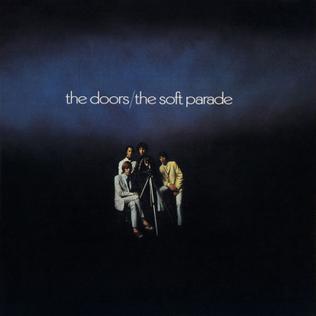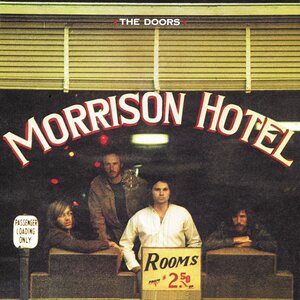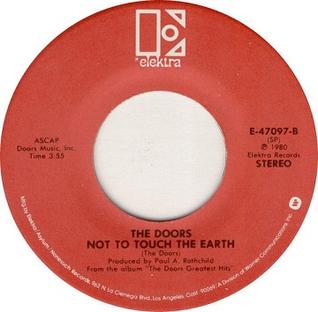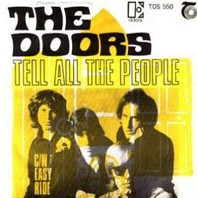
The Doors were an American rock band formed in Los Angeles in 1965, with vocalist Jim Morrison, keyboardist Ray Manzarek, guitarist Robby Krieger, and drummer John Densmore. They were among the most influential and controversial rock acts of the 1960s, partly due to Morrison's lyrics and voice, along with his erratic stage persona. The group is widely regarded as an important figure of the era's counterculture.

3 Doors Down is an American rock band from Escatawpa, Mississippi, formed in 1996. The band originally consisted of Brad Arnold, Matt Roberts and Todd Harrell, with Chris Henderson joining in 1998. The band rose to international fame with their debut single, "Kryptonite" in January 2000, which placed in the top three on the Billboard Hot 100 chart. The band signed with Republic Records and released their debut album, The Better Life, the same year. The album was the 11th-best-selling album of that year and was certified 7× platinum in the United States. The group was later joined by drummer Richard Liles, who played during the tour for their first album.

Waiting for the Sun is the third studio album by the American rock band the Doors. The album's 11 tracks were recorded between January and May 1968 at TTG Studios in Los Angeles. Released by Elektra Records on July 3, 1968, it became the band's only number one album, while also included their second US number one single, "Hello, I Love You". The first single released off the record was "The Unknown Soldier", which peaked at number 39 on the Billboard Hot 100. It also became the band's first hit album in the UK, where it reached number 16.

Robert Alan Krieger is an American guitarist and founding member of the rock band the Doors. Krieger wrote or co-wrote many of the Doors' songs, including the hits "Light My Fire", "Love Me Two Times", "Touch Me", and "Love Her Madly". When the Doors disbanded following the death of lead singer Jim Morrison, Krieger continued to perform and record with other musicians including former Doors bandmates John Densmore and Ray Manzarek. He was inducted into the Rock and Roll Hall of Fame as a member of the Doors and is listed by Rolling Stone as one of the 100 greatest guitarists of all time.

The Soft Parade is the fourth studio album by American rock band the Doors, released on July 18, 1969, by Elektra Records. Most of the album was recorded following a grueling tour during which the band was left with little time to compose new material. Record producer Paul A. Rothchild recommended a total departure from the Doors' first three albums: develop a fuller sound by incorporating brass and string arrangements provided by Paul Harris. Lead singer Jim Morrison, who was dealing with personal issues and focusing more on his poetry, was less involved in the songwriting process, allowing guitarist Robby Krieger to increase his own creative output.

Morrison Hotel is the fifth studio album by American rock band the Doors, released on February 9, 1970, by Elektra Records. After the use of brass and string arrangements recommended by producer Paul A. Rothchild on their previous album, The Soft Parade (1969), the Doors returned to their blues rock style and this album was largely seen as a return to form for the band. The group entered Elektra Sound Recorders in Los Angeles in November 1969 to record the album which is divided into two separately titled sides, namely: "Hard Rock Café" and "Morrison Hotel". Blues rock guitar pioneer Lonnie Mack and Ray Neapolitan also contributed to the album as session bassists.
Rick & the Ravens was an American surf rock and frat rock band founded in 1961, known as the forerunner of the Doors. Members Ray Manzarek, John Densmore, and Jim Morrison renamed the group in the latter half of 1965 after joining forces with Robby Krieger.

Absolutely Live is the first live album by the American rock band the Doors, released on July 20, 1970, by Elektra Records. The double album features songs recorded at concerts held in 1969 and 1970 in several U.S. cities. It includes the first full release of the performance piece "Celebration of the Lizard" and several other tracks that had not previously appeared on any official Doors release. The album peaked at number eight on the Billboard 200 in September 1970.
"Celebration of the Lizard" is a performance piece by American rock band the Doors, featuring lyrics written by lead singer Jim Morrison and music by the Doors. Composed as a series of poems, the piece includes both spoken verse and sung lyrics, musical sections and passages of allegorical storytelling.
"Five to One" is a song by American rock band the Doors, from their 1968 album Waiting for the Sun. The song's lyrics were written by lead singer Jim Morrison, though the songwriting credit identified each member of the Doors as songwriters.

"The Crystal Ship" is a song by American rock band the Doors, from their 1967 debut album The Doors, and the B-side of the number-one hit single "Light My Fire". It was composed as a love song to Jim Morrison's first serious girlfriend, Mary Werbelow, shortly after their relationship ended.

Legacy: The Absolute Best is a two-disc compilation album by American rock band the Doors. Released in 2003, it includes the uncensored versions of both "Break On Through " and "The End". Also included is a previously unreleased studio version of Morrison's epic poetry piece "Celebration of the Lizard," a rehearsal outtake from the band's Waiting for the Sun sessions.

"Not to Touch the Earth" is a 1968 song by the Doors from their third album Waiting for the Sun. It is part of an extended performance piece called "Celebration of the Lizard" that the band played live multiple times. A 17-minute studio recording of the complete piece was attempted during the sessions for Waiting for the Sun, and the lyrics were printed in their entirety on the gatefold LP sleeve, but only the musical passage "Not to Touch the Earth" was included on the LP.

"Hello, I Love You" is a song recorded by American rock band the Doors for their 1968 album Waiting for the Sun. Elektra Records released it as a single that same year, which topped the charts in the U.S. and Canada. Although the Doors are credited as the songwriters, songs by other artists have been identified as likely sources.

The following is the discography of the American rock band the Doors. Formed in Los Angeles in 1965, the group consisted of Jim Morrison (vocals), Ray Manzarek (keyboards), John Densmore (drums), and Robby Krieger (guitar). The Doors became one of the most popular rock bands of their era. Their debut album, The Doors (1967), released by Elektra Records, charted at No. 2 on the US Billboard 200 and produced the group's most successful single, "Light My Fire". The album received several sales certifications including a four times multi-platinum from both the Recording Industry Association of America (RIAA), and from the Canadian Recording Industry Association (CRIA). The Doors' second studio album, Strange Days (1967), sold well commercially but did not reach the same level of success as the debut, and failed to produce a major hit single. It reached No. 3 on the Billboard 200 and was certified platinum in the United States and Canada. The Doors' third studio album Waiting for the Sun (1968), was very successful, reaching No. 1 in the US and France, and produced their second No. 1 single, "Hello, I Love You". Waiting for the Sun was the first Doors album to chart in the United Kingdom, where it peaked inside the Top 20. The album was certified gold in that country by the British Phonographic Industry (BPI), as well as being certified gold and platinum in several other countries.

"Tell All the People" is a song by American rock band the Doors and was written by band guitarist Robby Krieger. It was the A-side backed with "Easy Ride" – an outtake from Waiting for the Sun recorded in March 1968 – and was released in June 1969. Also known as "Follow Me Down" due to the use of the phrase, it was the third single from the Doors' fourth album The Soft Parade. The song's instrumentation incorporates brass instruments and other orchestral instruments.

"The Unknown Soldier" is the first single from the Doors' 1968 album Waiting for the Sun, released in March of that year by Elektra Records. An accompanying 16mm publicity film for the song featuring the band was directed and produced by Edward Dephoure and Mark Abramson. The song became the band's fourth Top 40 hit in the US, peaking at number 39 on the Billboard Hot 100, and remained upon the Billboard Hot 100 list for eight weeks.

"Waiting for the End" is a song by American rock band Linkin Park, released on October 1, 2010. It is the second single and eighth track from their fourth studio album, A Thousand Suns, which was released on September 14, 2010. A music video for the single, directed by Joe Hahn, was released on October 8, 2010, on MTV.

The Brother Tour was the first tour by Irish boy band Boyzone following the death of Stephen Gately.















